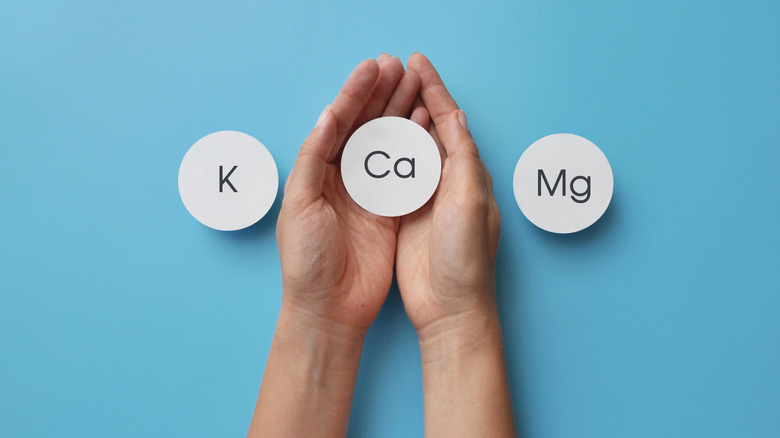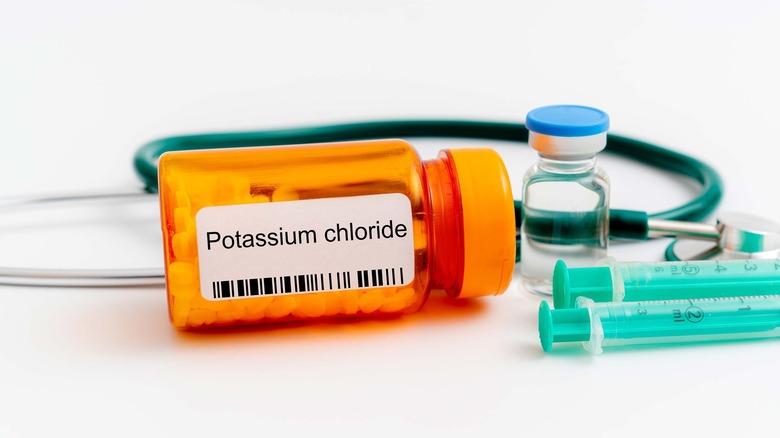What It Means When Your Potassium Levels Are High
Potassium is a mineral that keeps the muscles and nerves healthy while moving nutrients and waste products in and out of your cells (via Medline Plus). However, according to a 2014 article published in the British Medical Journal, many Americans don't consume enough potassium. Interestingly, despite the low potassium consumption, various factors can cause your potassium levels to rise.
According to the National Kidney Foundation, between 2% and 3% of the general population have abnormally high potassium levels in their blood. The ideal potassium count for adults ranges between 3.5 to 5.2 millimoles per 2 liters, says Cleveland Clinic. Your doctor can confirm your body's potassium value via a blood or urine test. Both high and low potassium levels have consequences.
A high potassium level is usually found by chance during a blood test (via Mayo Clinic). In many cases, symptoms don't appear. However, if it does come, you might experience numbness and tingling (via the National Kidney Foundation). More serious symptoms include muscle weakness, fatigue, nausea, paralysis, and abnormal heart rhythms, per Mayo Clinic.
We've looked at the symptoms of high potassium levels, but what does it mean when your potassium levels are high — and what are the main causes? Continue reading for more detailed information about high potassium levels, including the treatment options.
What do high potassium levels mean?
High potassium levels are also known as hyperkalemia. Anyone can get hyperkalemia, but people with underlying conditions like diabetes, renal failure, and adrenal disease are more susceptible, per a 2019 article published in the journal Nephrology Dialysis Transplantation.
It's the kidney's job to remove excess potassium through urine. Therefore, if any disease affects your kidney, limiting its ability to excrete urine, excess potassium can build up in your blood. However, various other factors can make your body reserve more potassium than your need, causing hyperkalemia (via National Kidney Foundation).
Excessively consuming potassium-rich foods can cause hyperkalemia even when you are physically healthy and have no kidney problems, per a 2014 case report published in the journal Psychosomatics. Some medications can also make it hard for your kidneys to remove excess potassium from the blood. Typical examples include hypertensive drugs and those prescribed for kidney and heart-related issues (via Drugs.com).
A 2014 review article published in the journal Drug Safety indicates some drugs can interfere with potassium homeostasis, impairing renal potassium excretion. Other drugs can increase your body's potassium supply, exceeding your kidney's excretion abilities.
Other potential causes include dehydration, serious injuries, or burns, which force your body to increase potassium supply to the blood, per WebMD. Apart from the earlier-mentioned risk factors, taking too many potassium supplements can also increase your susceptibility to hyperkalemia.
Diagnosis and treatment of high potassium levels
As mentioned earlier, most people with hyperkalemia don't have symptoms. Diagnosis is often made during a traditional serum potassium test, which checks the potassium content in your blood, according to Cleveland Clinic. Your doctor might also take an electrocardiogram (EKG), which helps detect heart rhythm irregularities.
Various treatment options exist for high potassium levels. Usually, the goal is to help your body regain the strength it needs to remove excess potassium quickly and stabilize your heart from succumbing to hyperkalemia complications (via Healthline).
Your doctor might first prescribe medications like diuretics which allow you to urinate excess potassium away. According to Medical News Today, you might also need dialysis if your situation is chronic. Dialysis can directly filter blood, eliminating toxins and reducing the body's total potassium levels.
You might benefit from certain lifestyle and dietary adjustments if you're highly susceptible to hyperkalemia. However, it's important to seek approval from your doctor first. Your doctor might also advise cutting your consumption of potassium-rich foods, as listed in the Dietary Guidelines for Americans.



